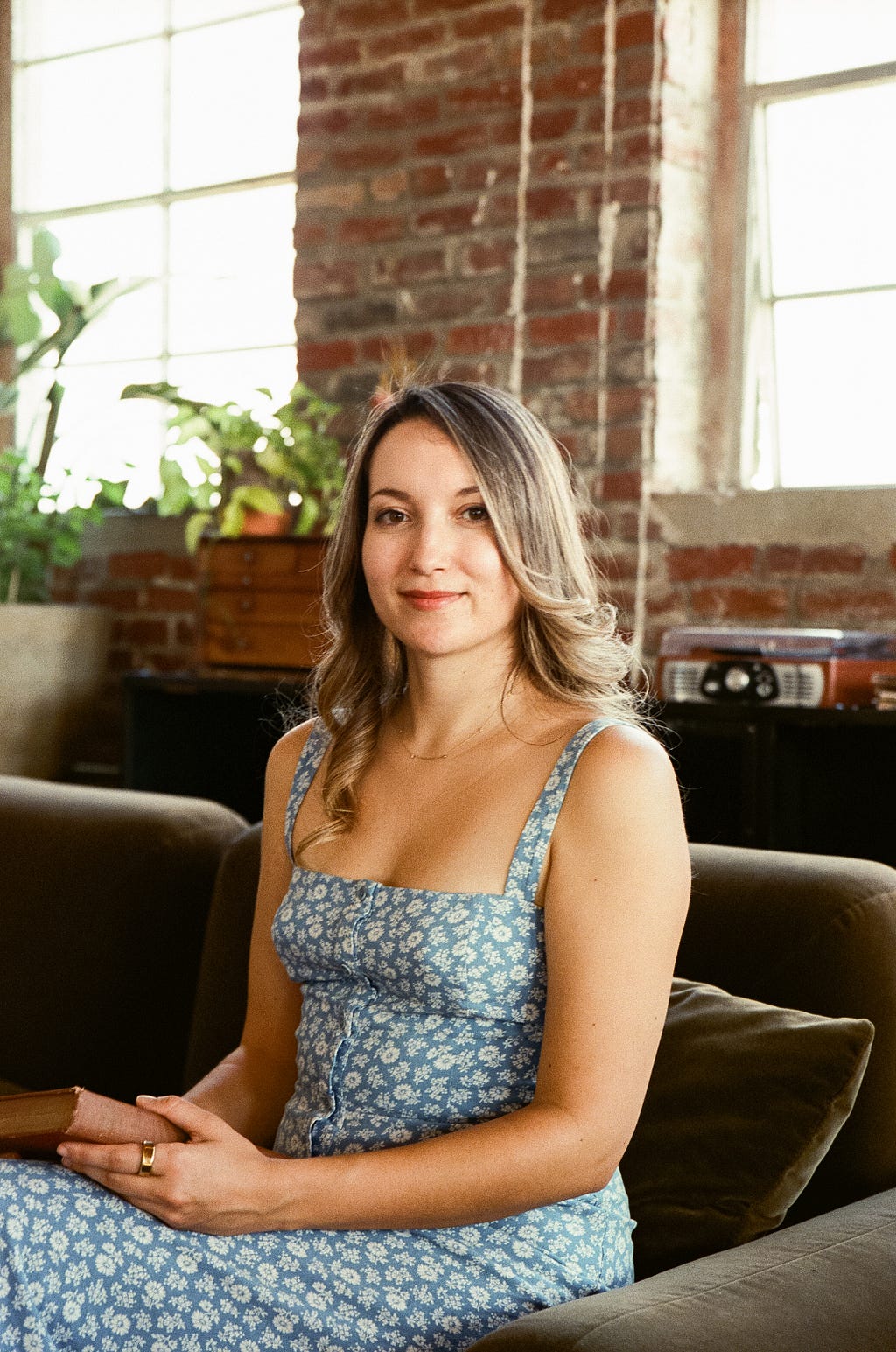
Write What You Love. If you’re writing a book just to make money, it will come across on the page and you won’t win over as many readers as you could have if you wrote from a place of passion. If you imbue your writing with a deep love and attention to detail, it will earn its place on bookshelves for decades to come and bring you passive income in the form of continuous book sales. This is why I write both fiction and nonfiction: I love helping people avoid the (plentiful!) mistakes I’ve made as a traveling writer and freelancer, and I also love the art of storytelling just for the sake of stories.
Writing a book can be a rewarding creative endeavor, and it can also be a profitable one if approached correctly. What are the strategies and steps needed to turn a book into a significant source of income? How do authors effectively market and sell their books, and what should they consider when navigating publishing options? As part of this series, we had the pleasure of interviewing Amy Suto.
Amy Suto began her career as a Hollywood TV writer before hitting the road and becoming a digital nomad and freelance writer, which was the subject of her nonfiction book Six-Figure Freelance Writer: A Holistic Guide on Finding Freedom in Freelance. Amy’s debut work of fiction is The Nomad Detective: Volume I, which also marks the start of the book series following Detective Violet Chase. Amy runs a Substack newsletter called From the Desk of Amy Suto about how to carve your path as a working writer. When she’s not writing, Amy travels the world and works remotely from cafes in Cusco, Peru — or is training to be a samurai in a dojo in Kyoto, Japan. You can learn more about Amy at: AmySuto.com.
Thank you so much for joining us in this interview series! Before we dive into the main focus of our interview, our readers would love to “get to know you” a bit better. Can you share a story about what motivated you to become an expert in the particular area that you are writing about?
Sure! I’ve been a memoir ghostwriter for the past 8 years, and I’ve written books for Olympians, pro athletes, entrepreneurs, and individuals with inspiring stories. I’m also an author myself, and I’ve written and published two books: a nonfiction book called Six-Figure Freelance Writer about how to build a successful freelancing career, and a fiction series called The Nomad Detective. I’ve spent my entire career understanding the innate power of books, but my love of this form stems back from when I grew up working in my family’s vintage bookstore. I’ve always been surrounded by books. Books are powerful: we forget that in the age of technology. But there’s a reason why books will never be obsolete. The pen is mighty, but the path to wield it is long.
Can you share a pivotal story that shaped the course of your career?
Landing my first few memoir ghostwriting projects altered my trajectory. I came up in Hollywood as a TV writer, but when I started moonlighting as a memoir ghostwriter, everything changed. My clients were fighting to work with me and flew me out to meet them in person. I saw that my storytelling skills were changing the lives of the people I was writing books for, and I felt way more valued in the memoir ghostwriting space compared to Hollywood — and I was having more fun!
Seeing the timeless nature of the book world, I decided to switch gears and focus exclusively on writing books for myself and my clients. That’s what I do full-time now as a freelance memoir ghostwriter and author.
What are some of the most interesting or exciting projects you are working on now? Are you working on any new writing projects?
I was recently flown out to Vienna, Austria to start work on a book project (but I can’t share any details, of course — that’s the name of the game as a memoir ghostwriter!) and in my own writing, I’m working on the second book in my Nomad Detective series that’s loosely inspired by my travels as a digital nomad. I’m also writing a romantasy novel.
Thank you for that. Let’s now shift to the core focus of our interview. In your opinion, what are the key strategies that authors should focus on if they want to generate significant income from their books?
There are two types of authors.
First, there are authors who are also entrepreneurs, and their books often serve as a lead magnet to expose new audiences to who they are and their bigger authors and ecosystems. These authorpreneurs are using their books not only to share their knowledge but also to drive revenue to their main business and bring awareness to their personal brand.
Second, there are authors (who usually focus on fiction) who write for the sake of writing, and books remain the main source of their income.
Both types of authors need to understand who they are writing for and where those ideal readers hang out online and in person. This will determine what marketing strategies to put the most time and effort into.
Marketing is crucial for book sales. What are the most effective marketing techniques you’ve used or seen others use to successfully promote their books?
There are so many different strategies that do really well for book marketing. Amazon Ads can do wonders for niche books or genre-specific books, and I know authors who make $100,000+ per year on a book of theirs that’s very clearly serving a well-defined audience. These authors take advantage of Amazon Ads to target that audience as close to the point of purchase as possible. But there are plenty of free strategies that do really well — one of which is nurturing your audience using an email newsletter, which I’ve found often beats social media in terms of book marketing. If you can get into someone’s inbox, you’ve already cut through a lot of noise. This is why I spend so much time on my Substack newsletter.
What role does social media play in book marketing, and how can authors leverage these platforms to boost their book sales?
I’ve seen authors make six figures on their books with absolutely no social media presence — just through methods such as podcast guesting, Amazon Ads, and giving away tons of free copies of their books to reviewers and book bloggers. However, it doesn’t hurt to build your own platform, as that’s a free way to get eyes on your books. It’s best to pick 1 or 2 platforms to really focus on. Pick the platform(s) where your ideal readers are spending the most time on.
How can you leverage the book to position you as an expert in your field?
For Authorpreneurs who are looking to get a strong ROI on their books, you first have to start by writing a great book. If you don’t have any training as a writer, consider hiring a book ghostwriter like myself to interview you and help compile your ideas and stories in an engaging way.
Writing a book is no small endeavor: I’ve seen entrepreneurs who try to write their own books nearly burn down their businesses in the process. Writing your book without any ghostwriting help can be a huge distraction — and ultimately ineffective if you aren’t skilled enough to turn out a good draft within a reasonable timeframe. Bestselling authors like Alex Hormozi and Robert Kiyosaki had co-writers/ghostwriters help them with their books, which shows how top authors openly rely on storytelling craftspeople to help them tell their stories.
Once you have a great book, the rest of the focus of book marketing needs to be around using your book as a launchpad. It’s a conversation starter for podcasts and press interviews, and a way to boost your authority. Writing a book is no small feat, and you’ll earn respect in your field by publishing a book worth reading in your niche.
How important is building a personal brand for an author, and what steps can authors take to establish themselves as credible and influential figures in their niche?
While authors can still sell books without a personal brand, it’s more of an uphill battle if you don’t have any sort of digital footprint. A cohesive brand makes it easier for new readers to take a chance on you and your work.
Branding goes beyond having a nice website: it’s about the “vibe” of your book itself, too. What does your book cover say about you as a writer? Does your author headshot represent your personality and “brand” as well? In what ways can every piece of your book and its online presence entice potential readers?
Do you know who your most valuable avatars are?
As a writer of both fiction and nonfiction, I have several different types of ideal readers. For my book Six-Figure Freelance Writer: A Holistic Guide on Finding Freedom in Freelancing, I want to reach writers who are curious about how freelance writing could change their lives, but haven’t started because they don’t know what to do. Or, freelance writers who are running into roadblocks and need some troubleshooting help. These ideal readers are also the people who benefit the most from the one-on-one coaching work I do for freelance writers looking to grow their businesses.
For my fiction series The Nomad Detective, I wanted to reach female readers of detective fiction who love globetrotting mysteries with a dash of action and romance. Because I’m currently traveling full-time as a digital nomad, this community has been my main focus when it comes to grassroots marketing.
Beyond just selling books, what other revenue streams can authors explore to maximize their earnings, such as speaking engagements, online courses, or merchandise?
Creating a paid newsletter on Substack is a huge revenue stream for writers — and it’s also a great platform to develop new material for your books on! I run a Substack at FromTheDeskofAmySuto.Substack.com where I write about how to make writing your job through a combination of book sales, Substack subscriptions, and freelancing.
If you’re an Authorpreneur, you can also drive new clients to your business through a book. This is best done through creating a book funnel, where your book is a stepping stone to your other offerings.
Merchandise is also another fun way to monetize. Alex Hormozi sold hats with his book bundles, and fiction authors often create special editions of their books or other types of art to help drive sales to their most engaged fans.
Have you created scaleable derivatives of your work? Can you explain?
Books themselves are inherently scalable and evergreen. They can either be a step in a funnel or a standalone product, and it only takes one stroll down a bookstore aisle to see how timeless a book is. Once you publish a great book, the value generated by your words can last for generations.
The world of book publishing is constantly evolving. What trends do you see shaping the future of book marketing and sales, and how can authors stay ahead of the curve?
Self-publishing is the true future of publishing. The print-on-demand model that Amazon KDP and other platforms use are just more efficient compared to having warehouses of books just sitting around and taking up space in the traditional model. Audiobooks are also growing in popularity and becoming more high quality in their production value, and more people are getting e-readers.
Authors shouldn’t be too concerned about staying ahead of the trends, but they should consider their personal goals for their books before choosing either the traditional publishing route or the self-publishing route.

Wonderful. Here is the main question of our interview. Based on your own experience and success, what are the “Five Things You Need to Know to be a Successful Writer?” If you can, please share a story or example for each.
1. Write What You Love. If you’re writing a book just to make money, it will come across on the page and you won’t win over as many readers as you could have if you wrote from a place of passion. If you imbue your writing with a deep love and attention to detail, it will earn its place on bookshelves for decades to come and bring you passive income in the form of continuous book sales. This is why I write both fiction and nonfiction: I love helping people avoid the (plentiful!) mistakes I’ve made as a traveling writer and freelancer, and I also love the art of storytelling just for the sake of stories.
2. Don’t Rush The Book Writing Process. I spent over a year writing and rewriting my book Six-Figure Freelance Writer, and about 6 months on The Nomad Detective. When I ghostwrite books for clients, I only take on a small number of projects at a time to give each book the attention it demands. So if you decide to write a book, honor the work and give it the space it needs — while still ensuring you’re making progress and not just procrastinating.
3. Read More Fiction. Reading fiction is good for your health: reading fiction has been shown to reduce stress and boost empathy, making us healthier, happier, and better citizens of the world. Nonfiction is great, but don’t forget to pick up a fiction book here and there. I found that my life improved ten times over when I stopped only reading nonfiction books and started reading fiction books purely for the enjoyment of it.
4. Start a Newsletter to Build a Writing Habit. All writers should have a newsletter. Period. Not only is it a great tool to help people discover your writing, but it’s also a great way to build and maintain a writing habit. Not to mention these early readers will become the first audience that jumps at the opportunity to buy your book when you’re ready to publish!
5. Focus on Progress, Not Perfection. Building a writing habit is more important than writing a perfect book. By simply writing on a regular basis, you’re building the skills needed to write a great book.
For authors just starting out, what common mistakes should they avoid when trying to turn their books into a significant source of income?
No amount of marketing spend can fix a bad book.
Most authors rush the book writing process, fail to work with a good ghostwriter or editor, and don’t get enough feedback before they publish their books.
But if you have a great book, word-of-mouth will do a lot of heavy lifting for you and it’ll be easier to win over new reader.
So if you’re just starting out, make sure you’re proud of your book before you ask people to pay for it.
Can you share any success stories or case studies of authors who have effectively turned their books into profitable businesses? What lessons can other writers learn from their experiences?
The most famous examples are entrepreneurs like Alex Hormozi and Robert Kiyosaki. But there’s a reason why nearly everyone who does a TED Talk has a book — it’s an instrumental step in creating success and sharing your knowledge.
If you want to be known and give back to the world, write a book. And get some help to do so!
We are very blessed that some of the biggest names in Business, VC funding, Sports, and Entertainment read this column. Is there a person in the world, or in the US, with whom you would love to have a private breakfast or lunch, and why? He or she might just see this, especially if we both tag them
I would love to chat with Sarah J. Maas, the author of the insanely popular book A Court of Thorns and Roses as well as many other great books. I’m a huge fan of her writing. She’s an expert at writing addictive storylines and vivid characters — something every writer aspires to do!
How can our readers further follow your work online?
They can read my work at AmySuto.com or subscribe to my Substack at FromTheDeskofAmySuto.Substack.com.
Thank you for these excellent insights, and we greatly appreciate the time you spent. We wish you continued success with your book promotion and growing your brand.
Amy Suto of Sutoscience On How to Make Money by Writing a Book was originally published in Authority Magazine on Medium, where people are continuing the conversation by highlighting and responding to this story.

